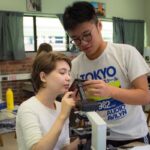We explain what constructivism is and who founded this pedagogical school. Also, its differences with the traditional model.

What is constructivism?
Constructivism is called a school of pedagogy based on the principles of the constructivist theory of knowledge that is, in the understanding of teaching as a dynamic, participatory task, in which the student is provided with the tools to develop on his or her own the resolutions to the problems that arise.
The founder of this constructivist current is the German philosopher and pedagogue Ernst von Glasersfeld who maintained the impossibility of “transmitting” knowledge, as is traditionally thought, advocating rather the “viability” of the information, that is, leading the learner to reach the answer on his or her own. From there, action-oriented education is born.
Constructivism is based, at the same time, on the studies of Jean Piaget and Lev Vygotsky, who were interested in the construction of knowledge from interaction with the environment, and in the internal construction of knowledge thanks to the social environment, respectively. . Similarly, there is the approach of Albert Bandura and Walter Mischel, who proposed cognitive and social learning.
All of these approaches, along with the postulates of behavioral psychology (behavior), allowed the renewal of the teaching paradigms of the time, which allowed for great criticism of the educational system as a whole.
See also: Pedagogy
Differences with the traditional model

Instead of standing in front of everyone to recite a class, as is more traditional, the teacher who uses constructivist pedagogy presents his method as leading the group towards the tools (mental, conceptual, physical) that allow him to assume an active role in understanding and acquisition of knowledge. That is, knowledge cannot be transmitted from the teacher to the student, but rather must be “constructed” by one's own will, and the role of the teacher is to provide the conditions for this to occur.
This constructivist teaching exercise revolves around three different ideas:
- The student is responsible for his or her own learning, not the teacher alone. Therefore, it has a much more active role assigned than in other pedagogies.
- The contents to be taught do not come from nowhere, but are the result of a previous series of elaborations at a social level.
- Teachers or facilitators must not only build the scenario for the encounter with knowledge to occur, but must also guide said learning activity towards a rich and diverse mental activity.





